Ask.fm owners 'considered shutting down' social network
- Published
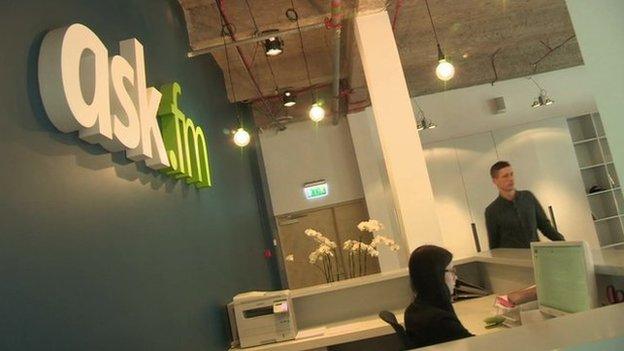
Newsbeat visited Ask.fm in May 2014 when the company first addressed criticism about cyberbullying
In the summer of 2013, things could not have been much worse for Ask.fm.
After being linked to several teen suicides, the social network found itself at the centre of a media firestorm.
Grieving families pleaded with people to avoid it, campaigners called for its closure and the Prime Minister said users should stage a boycott.
Add Islamic State recruitment tips to that on the platform and you had a company with a reputation in tatters.
Ask.fm was toxic. Damaged goods. The lack of moderation led to a free-for-all where bullies could hide and do their worst.
It therefore came as a surprise to those of us who'd watched the company lurch from one crisis to the next that it was bought in August 2014 by the well-established and similarly named internet company Ask.com.
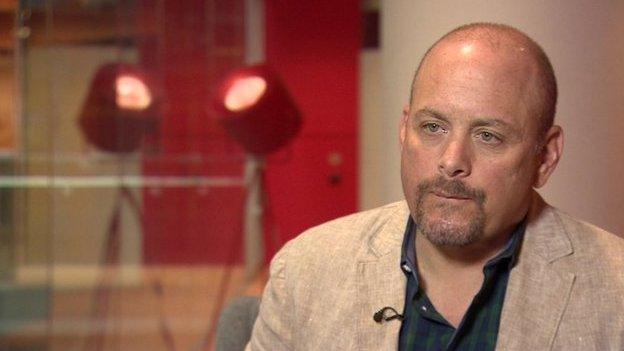
Boss Doug Leeds admits he considered shutting down Ask.fm after his company bought the network in 2014
Surely the only sensible thing to do would be close the whole operation?
"The answer is yes," said Doug Leeds, CEO of the controversial social network's new owner Ask.com.
"We did look at shutting it down and we thought about it significantly as an option."
Speaking to Newsbeat from the US, he said the company decided that it was worth trying to turn Ask.fm around.
"We came to the conclusion that there's a good business here as long as you make the service safer."
And that is what Ask.fm's new parent company IAC, which owns online brands including Tinder and Vimeo, is banking on.
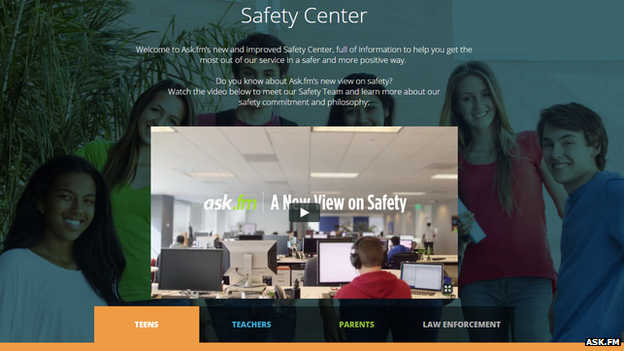
Ask.fm says its new Safety Centre will offer users and parents help and advice on how to avoid abuse
The launch of a new safety centre, external providing advice to teenagers, parents and the police is proof, the company claims, of its commitment to keeping its users safe.
A slick video attempts to present a caring and considerate company in which staff admit safety "had to be improved".
There are tips on "being smart and safe" and "dealing with cyberbullying" along with an explanation that in "certain circumstances" the company may hand over user data to law enforcement agencies.
It's far more extensive than the token effort made by Ask.fm's previous owners, who have now left the company, but surely allowing users to stay anonymous is inviting abuse?
"Our motto since we bought the company has been anonymity with responsibility," said Leeds.
"We think there are a lot of benefits - and obviously users agree - to anonymity.
-
June 2010
×Ask.fm is set up by brothers Ilja and Mark Terebin as a rival to question and answer based social network Formspring.
-
December 2011
×Privacy settings introduced to Ask.fm, including the option to disable anonymous questions.
-
September 2013
×Ciara Pugsley, 15, is found dead in woodland near her home in County Leitrim, Ireland. This was the first of several teen suicides linked to abuse via ask fm.
-
August 2013
×Hannah Smith, 14, is found hanged at her home in Lutterworth, Leicestershire. It is believed she killed herself after she was bullied on the site.
-
August 2013
×Prime Minister David Cameron urges people to boycott sites which do not 'step up to the plate' and tackle online abuse. He said that after the 'absolutely tragic' death of Hannah Smith, those running the websites had to 'clean up their act'.
-
19 August 2013
×Changes made to make Ask.fm safer in the wake of online bullying cases. It said it would view all reports within 24 hours, make the report button more visible, and include bullying and harassment as a category for a report.
-
September 2013
×In the 2013 Annual Cyberbullying Survey by charity Ditch the Label, Ask.fm is named as one of the three most likely places teenagers experience cyberbullying, alongside Facebook and Twitter.
-
February 2014
×Ask.fm launches a 'Safety Center' containing advice and guidance for users of the site and their parents.
"You can ask questions that you wouldn't feel comfortable asking."
Allowing users to hide their identity is clearly a big attraction to Ask.fm's 150 million users, who are mainly teenagers.
But providing anonymity, while ensuring it is not used as a veil of secrecy for bullies, is Ask.fm's greatest challenge.
"That's where we draw the line; when anonymity is being used as a method to cause harm then we can take action and it isn't appropriate for our service," said Leeds.
Moderation and enforcement of rules is difficult, with 50 million questions being asked on the network every day.
But Ask.fm is trying, with the help of technology.
Jonathan Blake explains why the site has made headlines
They have extended the use of software to scan questions and answers posted by users for key words and phrases.
"We've expanded the number of filters we're using, we've increased the vocabulary that we use, we've added new employees to look at this content," said Leeds.
"We're now seeing about 40% more content in total than we saw before either before it gets to a user or just afterward and usually we can respond in under 15 minutes to anything that we're seeing that isn't appropriate," said Leeds.
There will also be more oversight of what the company is doing, with a Safety Advisory Board made up of leading figures in online safety.
John Carr, secretary of the British Childrens' Charities Coalition on Internet Safety, is among its members.
He claims the approach taken by Ask.fm's previous owners of offering free speech with light-touch moderation did not work.
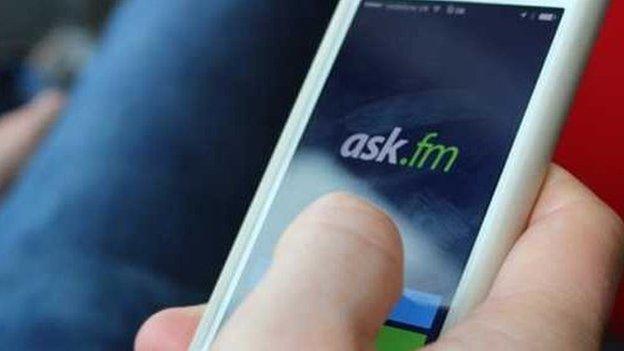
Ask.fm will launch a new mobile web version after seeing a drop in the number of users signing up
"There was a naivety there, but that's all history now," he said.
"It's a big investment in clever technology and people, that's what's going to make the difference."
He acknowledged that the rapid rise in popularity of Ask.fm without adequate safety measures led to its poor reputation.
"These things can become very fashionable, they get gigantic numbers of users rapidly, but if you haven't got the safety mechanisms in place that's when things can go badly wrong."
The question has to be asked though, whether the damage has been done.
In the world of social networking, new companies come and go almost daily. Ask.fm set itself apart by allowing, perhaps encouraging, users to stay anonymous.
Now it is just one of many in a crowded market with apps including Whisper, Secret and YikYak jostling for position.
Ask.fm admits it has lost users since its run of bad publicity, partly as a result of changes put in place.
When Newsbeat visited Ask.fm's head office in Latvia in May 2014, 17-year-old student Sophie Downes from Flintshire was one of many who told us about the abuse she faced on the site.
A few months later she and her friends have moved on.
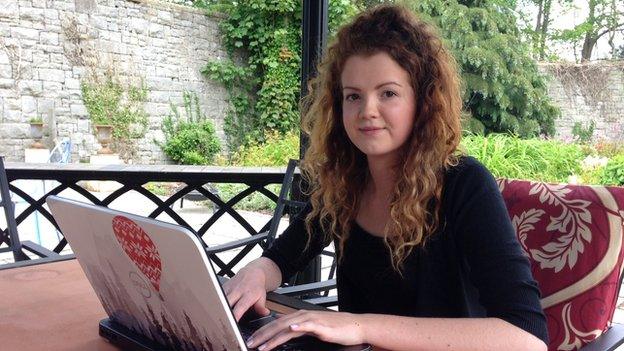
Sophie has been a victim of anonymous online abuse and says she no longer uses Ask.fm
"I'm glad they're finally doing something to improve their safety policy, but I actually don't use the site any more.
"It seems to have lost popularity within my friendship group," she said.
Ask.fm is staking its future on allowing "anonymity with responsibility".
To survive, it will need to prove that phrase is more than a slogan.
If you or your friends are experiencing any negativity online, search for BBC Advice where you can get information and support.
Follow @BBCNewsbeat, external on Twitter, BBCNewsbeat, external on Instagram and Radio1Newsbeat, external on YouTube